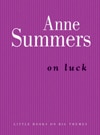 Working with a range of interesting clients brings its own rewards. One of them is reading Anne Summers’ body of work, which now includes On Luck, a book in the Little Books on Big Themes series from Melbourne University Press in which prominent Australians address a topic in about 10,000 words, published in pocket-sized hardback: Gay Bilson On Digestion, Germaine Greer On Rage, Barrie Kosky On Ecstasy, and so on.
Working with a range of interesting clients brings its own rewards. One of them is reading Anne Summers’ body of work, which now includes On Luck, a book in the Little Books on Big Themes series from Melbourne University Press in which prominent Australians address a topic in about 10,000 words, published in pocket-sized hardback: Gay Bilson On Digestion, Germaine Greer On Rage, Barrie Kosky On Ecstasy, and so on.
It’s no surprise that Summers was included as she has been one of this country’s finest thinkers, social commentators and journalists for more than a generation.
The thing with Summers is that while she is an attentive observer and an astute analyst, she is also a bloody good writer.
On Luck considers Australians’ particular relationship with luck, chance, fortune and misfortune. It exoplores our deep-rooted, abiding and inevitably destructive relationship with gambling, from the corrupt behaviour of an individual railways clerk to the social implications for a state dependent on gambling taxation.
With characteristic forensic research, Summers lays out plenty of food for thought:
Australians are ready to spend as much as $60 a week on lottery tickets yet are unwilling to invest even a third of that on their retirement …
And she doesn’t mind putting the boot in:
We advertised ourselves as lucky, which, when you think about the randomness involved in such good fortune, is another way of boasting of being lazy. All that bounty for no effort …
Also inevitable – mandatory, just about, when the words ‘Australia’ and ‘luck’ come into close proximity – is some kind of reflection on The Lucky Country and how the title of Donald Horne’s 1964 book became misappropriated as the self-congratulatory slogan of a country suddenly aware of its riches in mineral resources.
Summers does not disappoint, explaining how Horne was actually referring to a problem he discerned then in how Australia as a nation had got where it had because of luck rather than expertise or application. Summers doesn’t seem to feel the situation has changed.
The problem with luck is the lack of control, and while luck might theoretically carry you forward indefinitely, you can’t rely on it – the consequences of doing so are dire. It’s no coincidence that seasoned professional gamblers do not rely on luck.
Recent developments such as our increasing understanding of climate change to the downturn in international financial markets emphatically affirm Summers’ closing injunction for us to “Stop chancing our arm and start plotting a course”.
It’s an entertaining and provocative read, with Summers’ challenges to the nation coming across as within our power to meet, should we choose to stop believing in our luck.